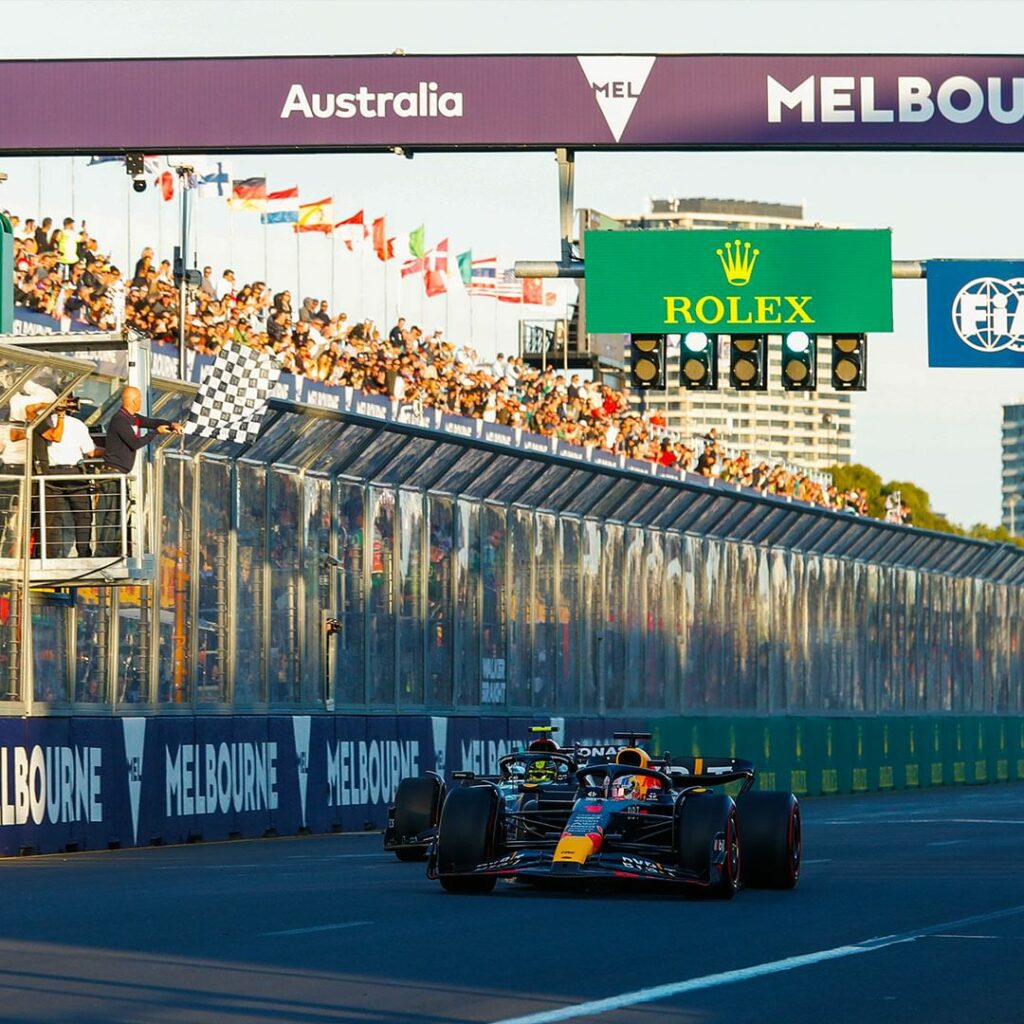If you’re someone who goes around believing that life is fair – or should be fair – are you labouring under a misapprehension? Or, more bluntly, are you naive? Answers: probably and maybe. I don’t know.
I do know this, though: you’re more inclined to think about these things after meeting Alex de Minaur, who at time of writing was ranked the 24th best tennis player in the world. Twenty-fourth. Impressive.
But such is the way many people view sport, 24 can make you an also-ran. It can make you a journeyman. For the record, de Minaur himself is dissatisfied with 24.
Does he deserve to be ranked higher? By the hard maths of the ATP rankings, no. You’re ranked what you’re ranked. But what about by other measures – measures you can see, feel and admire but not calculate? Yes. By these other, vaguer criteria, I believe de Minaur deserves better.
Before we go on, you need to know when this piece was written. It’s 24 January, the morning after de Minaur played Novak Djokovic in the fourth round of the Australian Open. In the media, there’d been a big and breathless build-up. De Minaur, the last local hope, was in form, and while Djokovic is Djokovic, there was meant to be something wrong with his left hamstring, so decent judges were giving the Australian, 23 at the time, a fighting chance.
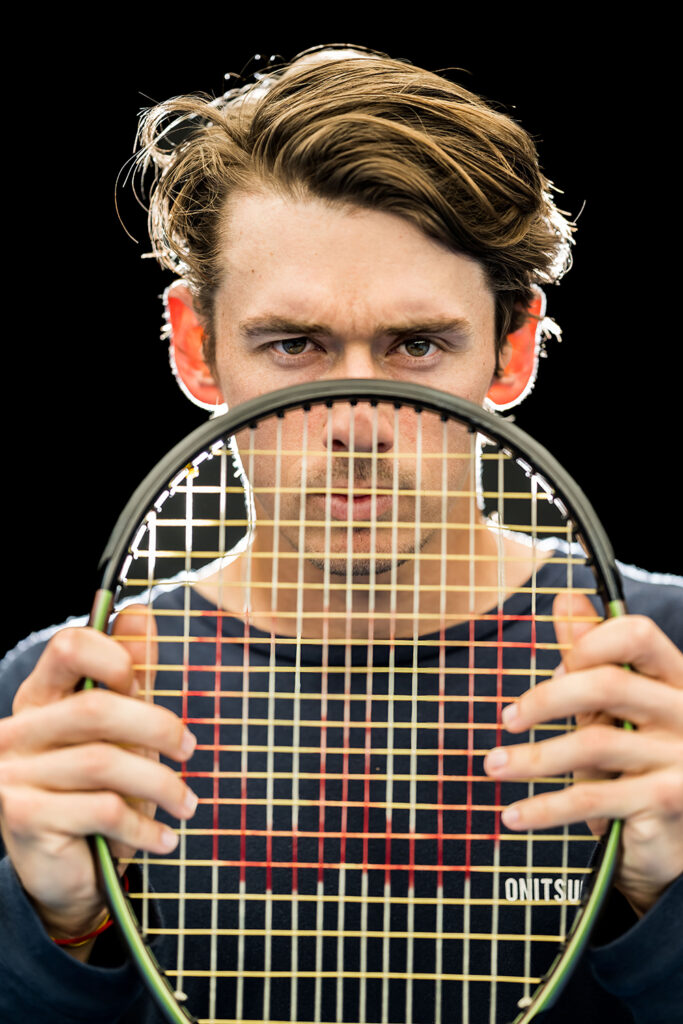
But Djokovic didn’t just beat de Alex de Minaur, he embarrassed him in a prime-time clinic. Made him look like a work-experience kid. Now, de Minaur has a vast capacity for positivity. But in the hours after the slaughter, surely even his world would have turned black. Not because he’d been trounced, but because Djokovic gave him a two-hour look at the unattainable. It felt like Djokovic, looking more than ever like a perfectly proportioned, imperious tennis maestro, performed at a level to which de Minaur (and just about everyone else for that matter) can only aspire.
So, if you’re Alex de Minaur, what do you do next? Well, for starters, you don’t give up – even though nothing about his professional life is about to get any easier.
When good is not enough
Exactly a month before the Djokovic whipping, I’m sitting courtside with de Alex de Minaur at an all-but-empty Ken Rosewall Arena at Sydney Olympic Park. He’s just flown in from somewhere far-flung place to prepare for the tour’s Australian swing, and though he’s weary, he’s ready to talk. The sleeves of his long-sleeved T-shirt are pushed up and I note the prominent veins of his forearms, a sure sign of high-level fitness.
I’d spoken with de Minaur once before, in late 2019 when he’d held a similar ranking to now, but back then he was more the hot prospect – the up-and-comer who’d split his childhood between Australia and Spain and benefited from exposure to two contrasting systems of tennis development. Today, I suggest to him there are two ways to view his current ranking: one, that it’s impressive how he’s managed to hold his own for three years on a ridiculously competitive tour (he reached a career-high No. 15 in June 2021); or two, that it must be frustrating to have hovered around the same spot for so long.
“Yeah, well, I think you’ve described it very well,” says de Minaur, who looks at you when he’s talking to you and exudes not a trace of egotism. “I’ve been happy with the performances I’ve been putting in to stay in that spot, but part of me is never satisfied. That’s the way I am.”
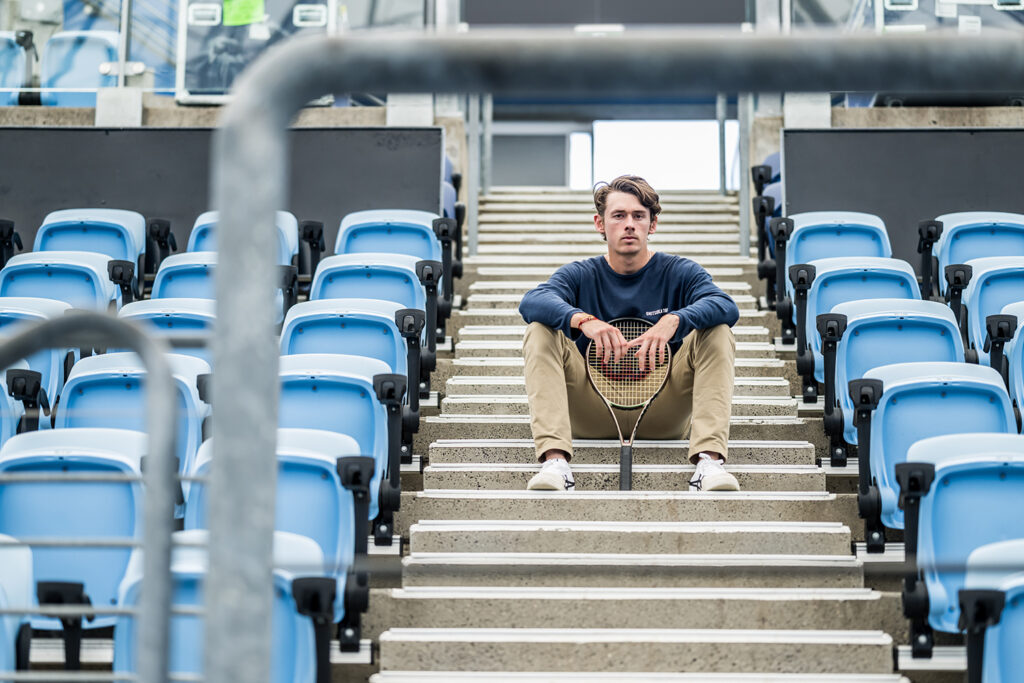
His quest for improvement is relentless and includes trying to alter his body shape – to build muscle that will, in theory and practice, allow him to hit the ball harder and shorten points so fewer of his matches devolve into battles of attrition. When you’re as agile, disciplined and consistent as Alex de Minaur is, you can win most of those battles when you’re in your early 20s, but eventually they’ll take chunks out of you and shorten your career.
“Since 2019, I’ve put on 4-5 kilograms, and I’ve definitely noticed it,” he says. “We [his team] have put in a lot of work in the gym. Preseasons are huge for us, because we want to make sure I’ve built that muscle and I have a little bit more power in my shots, but at the same time I don’t want to lose what makes me myself, which is my speed and movement.” (De Minaur’s nickname, Demon, is a shortened version of Speed Demon.) When you’re naturally slender, the task of keeping on muscle when you’re routinely running yourself ragged could drive a man spare. Your only chance is to eat up and squeeze in workouts between tournaments, even though you’re invariably dealing with soreness as well as bouts of disappointment ranging from mild to crushing. As much as de Minaur may prefer to float in the hotel pool or binge on movies, his willingness to move heavy iron in these circumstances sets him apart.
“Yeah,” he says, “I hit it hard. I’ve been lifting a lot more weight, combining that with a lot of cardio. It’s
a constant grind of trying to get better, trying to keep improving every day. For me, a big thing is that if I’m feeling physically fit, then mentally, I feel like I’m ready to go against anyone.”
Which is how he would have felt before facing off against Djokovic, after which, you would hope, in time, once he’d picked up the shattered pieces of his morale, he would have found a new story to tell himself, so that the grind didn’t feel pointless for too long.
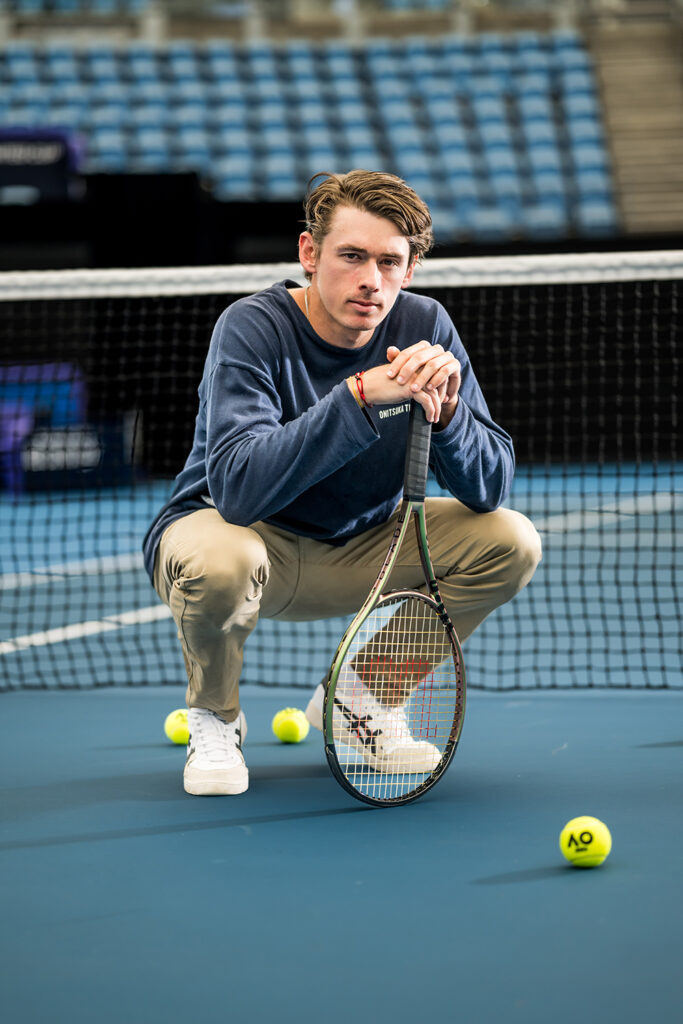
A matter of attitude
It would be nice to write a story about de Minaur without mentioning Nick Kyrgios, but I guess this isn’t the one. On court, Kyrgios has weapons that de Minaur lacks, and something else too – his supporters would call it charisma; his detractors something else – that few would attribute to the younger man. I think it would be safe to say that, offered a choice between watching Kyrgios or de Minaur, most people who have only a passing interest in tennis would choose Kyrgios every day of the week.
If you play a bit of tennis, though, and understand its challenges and frustrations well enough, it’s more likely that you feel a greater kinship with de Minaur, who does nothing besides go about the business of trying to win, picking fights with no one, finding nothing to complain about, nothing to erupt about, nothing to be a victim of.
De Minaur’s Davis Cup captain, Lleyton Hewitt, has offered this passionate character assessment of de Minaur: “The kid is a sponge. His willingness to learn is something I admire, and his dedication to Australia is why this country has fallen in love with him. Every time he steps onto that court [for Davis Cup], I know that he will go that extra distance for me. It’s not the results that make me proud, it’s knowing that when he plays, he’s not just doing it for himself, he’s doing it for me, the coaches, his teammates, his country and everyone else behind the scenes. That’s the quality of the person he is.”
Is de Minaur simply a calmer soul compared to Kyrgios? Maybe. Or maybe his suffering is more internalised.
We get to talking about the various areas in which he’s searching for improvement, coming eventually to off-court matters. Is he happy away from tennis in a way that might help his game? Does he have balance? Love?
I prepare for a defensive response, but instead de Minaur becomes pensive.
“Look,” he says, “I think that’s something that’s been a big focus recently. There was a stage where my life was basically… [consumed by tennis]. I was applying a lot of pressure to myself. Basically, my off-court life was a direct image of my results on the court. If things were going well, then it was all happy days. But if they weren’t… look, I didn’t have anything off court, or I wasn’t paying enough attention to off-court interests, to stabilise myself.”
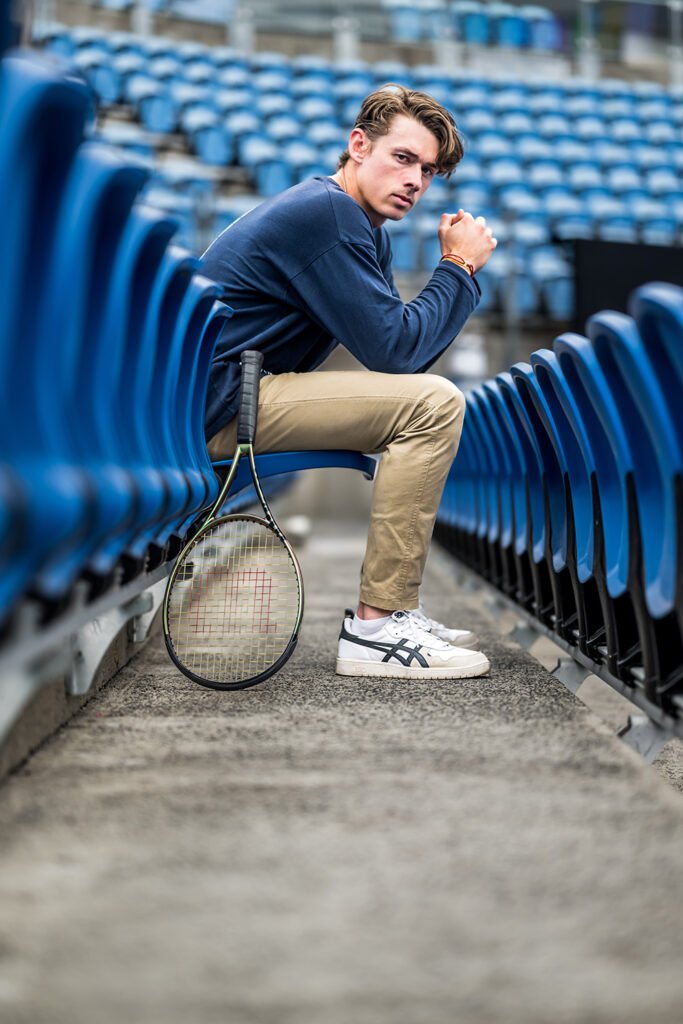
De Minaur’s long-time coach, Adolfo Gutierrez, had been telling his charge for years that the player’s mental state was excessively tied to his tennis fortunes. But how often in life do you change purely in response to another’s words? Rarely? Never? We’re wired to learn stuff the hard way, changing only when we see truths for ourselves.
What de Minaur realised is that playing tennis on the ATP Tour is not what you might call a normal job, and thus the standard rules of workplace cause and effect do not apply to him. If you hold a normal job, he argues, getting ahead is a relatively straightforward matter of working hard and purposefully. Likewise, he adds, “in school, if you buckle down and finish an assignment on time, you’ll get a good grade”.
In the realm of elite tennis, however, things aren’t so simple. There, you can do everything right in terms of preparation, but nothing you do will guarantee a certain outcome. There are simply too many unknowns, too many variables, too many factors beyond your control, beginning with the talent of the guy on the other side of the net. Unfortunately, that guy is not a prop in the story of your life, any more than you’re a prop in his.
“You can’t control everything in life and that’s what I find the hardest,” de Minaur says. “You put a lot of sacrifice in, you want to get that success. But a lot of times in tennis, you work very, very hard and don’t get the grade you want. It’s part of the tennis life and something I’ve had to learn to deal with.”
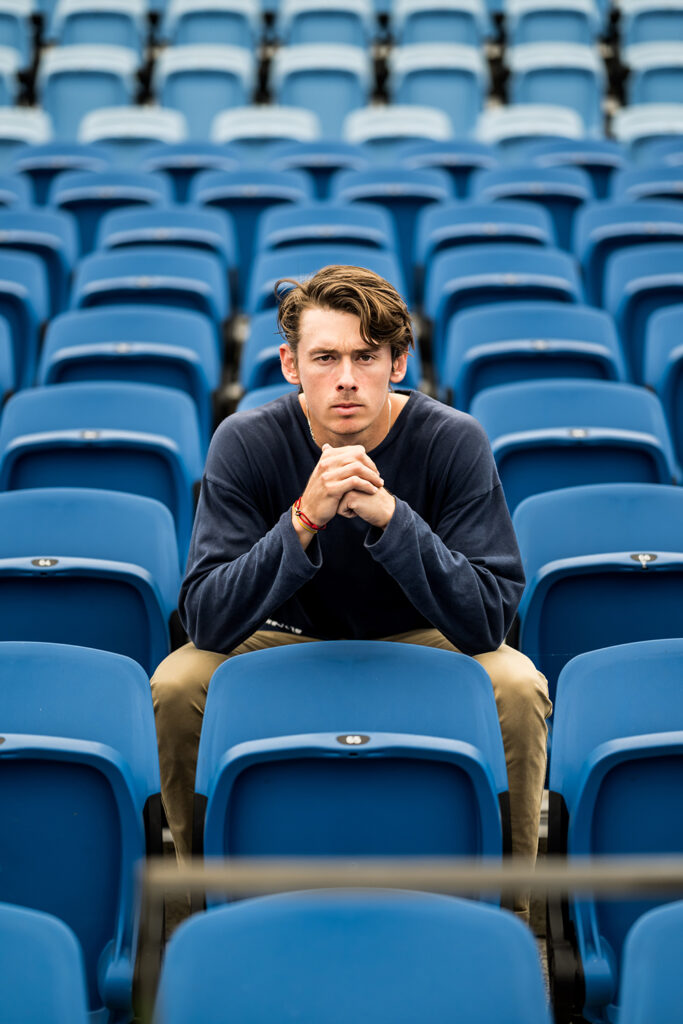
And now?
“I’ve just learnt to enjoy life a lot more, spending time with family, and it’s about to be three years with my girlfriend [British player Katie Boulter]. I’m just trying to take it easier. What I’ve learnt is that I’m my own biggest enemy, in that nobody else is going to apply more pressure or anxiety. Because I expect the most. I know the hard work I put in. I know all the hours I put in. And I’m a person who expects results. But it’s also realising that I’ve played my best tennis when I’ve been at ease.”
Recently, de Minaur made a change to his coaching arrangement that reflects this dual desire to move ahead with a certain lightness of being. Guiterrez isn’t going anywhere (“I’ve been very blessed with Adolfo,” de Minaur says; “he’s been like a second father to me and is one of the most positive guys there is, and he’s had to deal with me for a very long time”) but he’ll share the coaching duties with former Australian Davis Cup player Peter Luczak – “another insanely positive guy who’s always in a good mood”. In addition, de Minaur will consult, according to need, with a psychologist he’s been working with for the last five years, and try to spend at least a few extra days at home this year in Alicante, Spain – he managed a total of just 15 in 2022.
“I’m at the stage now where i can’t use as an excuse being a newbie on tour… It’s time to push it.”
The big squeeze
For well over a decade, the Big 3 so dominated men’s tennis that subsequent generations have struggled to make an imprint in the record books. At last, with Roger Federer retired and Rafael Nadal seemingly (I stress seemingly) slowing down, there looks to be a wider opening for guys like Alex de Minaur to start winning majors. Of course, life never stands still, and there’s upward pressure coming now from a batch of fresh-faced players, led by the Spaniard Carlos Alcaraz, who became the world No. 1 last September at the age of 19.
That’s right: de Minaur had been paying his dues and licking his wounds for five years, and then Alcaraz came along, won a major (the US Open) and reached No. 1 before half the world knew who he was. How, I ask de Minaur, did that turn of events make him feel? Dispirited, perhaps?
He won’t hear of it.
“Everyone wants [the top ranking] and that’s the beauty of it,” he says. “Ultimately, you don’t want to be up there because others aren’t playing. You want to be up there because you’ve beaten the best in the world.”
Encouragingly for de Alex de Minaur, he held two match points against Alcaraz on clay in Barcelona last April before the match slipped away from him. His intention for 2023 is to keep putting himself in those winning positions against the best guys and go one better on the back of hard-earned experience and smarter choices under pressure. “I’m at the stage now where I can’t use as an excuse being a newbie on tour,” he says, “and this is probably the time for me to do some damage on the tour and not really be content around the 20-odd [ranking] mark. You know, really push it… push that 10 mark.”
Just maybe the loss he suffered to Djokovic in January deflated de Minaur for longer than a few days, but chances are, it didn’t. He’s just not the type to dwell. He’s the type to pick himself up, hit the practice court, and resume the hunt for answers, before leaving it all out there at the next big tour stop. (Just before this issue went to press, de Minaur beat world No. 5 Andrey Rublev in Rotterdam.)
You seem as motivated as ever, I tell him – not at all like someone worn down by the grind.
“The way I see it is that I haven’t achieved what I want to, so I’ve still got the carrot in front of my face and I’m going to keep running until I get it,” de Minaur says. “I don’t have the game style where it’s going to come easy, but the struggle is going to make it that much sweeter when it does come. I’m very stubborn. I don’t have a doubt in me that I will get there. It’s just a matter of when.”
















